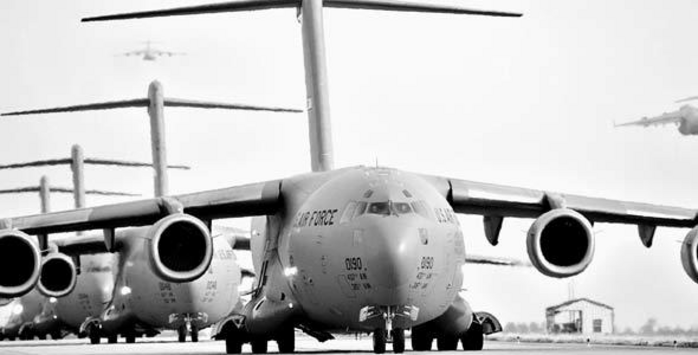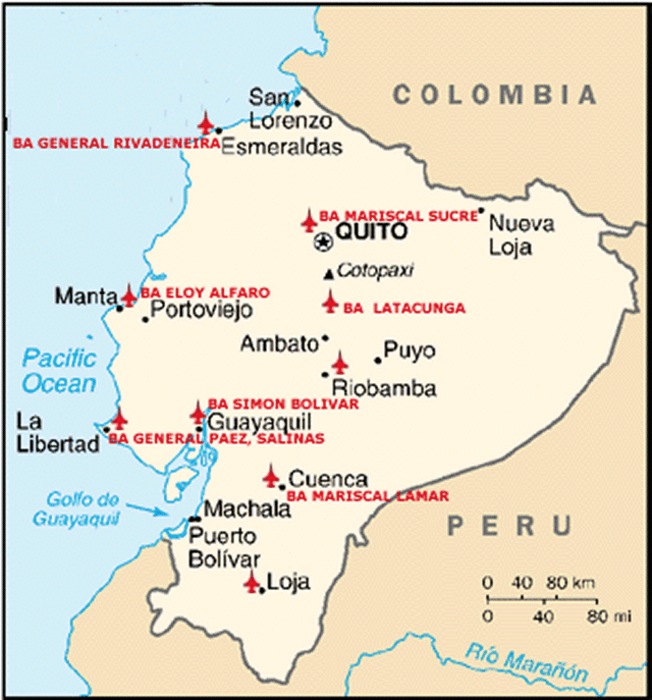The Complete Withdrawal of the US Military from Ecuador: A Victory for Sovereignty and Peace in Latin America
Fuse Yūjin
Translated by Philip Seaton
US forces withdrew completely from Ecuador in September 2009. How does the Democratic Party of Japan’s coalition administration see the “victory for sovereignty and peace” as it sways between the imperatives of the Okinawan people’s will and the US-Japan Alliance with respect to the transfer of the Futenma Base on Okinawa? This is the second in a two part series on US military bases. The first part is Kageyama Asako and Philip Seaton, Marines Go Home: Anti-Base Activism in Okinawa, Japan and Korea
In Spanish, Ecuador means “equator”. Manta is a port town facing the Pacific Ocean in the west of the country. On the coast is a large Ecuadorian air force base. From 1999, the American military had been using the base as a Forward Operating Location (FOL).
|
US planes withdrawn from Manta, Ecuador, were transferred to Colombia. |
Ecuadorian President Rafael Correa announced that the agreement leasing the base, which expired in November 2009, would not be renewed. The American military ceased operations from the base on 17 July 2009. The last personnel left the base on 18 September, and the facilities used for a decade by the American military were all returned to Ecuador.
At a ceremony marking the American withdrawal, Foreign Minister Fander Falconí made the following strong statement: “The withdrawal of the American military is a victory for sovereignty and peace. Never again foreign bases on Ecuadorian territory, never again a sale of the flag.”1
Meanwhile, a relieved Defense Minister Javier Ponce commented: “I am glad that President Correa has fulfilled his election pledge and preserved the constitution.”
On the same day in the capital Quito, the citizens’ group Anti-Bases Coalition Ecuador held a concert of celebration. In exuberant Latin style about 200 people celebrated the American military withdrawal with singing and salsa dancing at an amphitheater. Messages of congratulation were read out from anti-base movements across the globe, starting with Japan, and each was greeted by loud applause.
Helga Serrano, the coordinator of the Anti-Bases Coalition, commented during a slide show that looked back over the struggle, “This is a victory not only for the Ecuadorian people, but also for the network of people across South America and the globe who have fought for the removal of foreign military bases.”
Ecuador as a base for US intervention in Colombia
Using the pretext of “cracking down on drug trafficking”, the US was able to sign a ten-year lease on the base with former President Jamil Mahuad in 1999. Following the signing, AWACS (Airborne Warning and Control System) and P3C maritime patrol aircraft were stationed at the base, along with around 400 military personnel at its peak.
Martha Youth, a spokeswoman for the US Embassy in Quito, announced at the closing ceremony on 18 September that along with other Forward Operating Locations in Central and South America, a total of 700 tons of drugs with a value of 35.1 billion USD had been seized. “We’ve done good work in cooperation with the Ecuadorian authorities”, she said.2
However, Pablo Lucio Paredes, head of CONADE (Comisión Nacional de Control Antidopaje del Ecuador) gave a different view.
“Our country has received no benefits from American operations out of the Manta base these ten years. From the outset, the base’s real purpose was linked to the American geopolitical strategy to involve our country in the civil war in neighboring Colombia.”
The US base was located at Manta, Ecuador
In the same year that the Manta Air Base lease was signed, the pro-American government in Colombia started a cleanup operation Plan Colombia against the rebel group FARC (Fuerzas Armadas Revolucionarias de Colombia, Revolutionary Armed Forces of Colombia). Then in 2001, when the US began its global “war on terror,” Plan Colombia also came to be seen as part of it.
As operations against FARC intensified, conflict expanded into the border regions with Ecuador. The Colombia military, with support from the US, engaged in the large-scale aerial dispersion of defoliant on the pretext of “the elimination of drugs”. This caused serious damage to the health and agriculture of people living on the Ecuadorian side of the border.
Around the Manta Air Base, women and young people faced greater harm: there was an expansion of the sex industry and increased numbers of crimes committed by American service personnel, who were given local immunity from prosecution under the terms of the Status of Forces Agreement (SOFA). Furthermore, there were successive incidents of fishing boats or boats carrying immigrants being attacked or detained by the American naval vessels that frequently came to Manta port. All these incidents caused mistrust of the American military to slowly grow.
Foreign Bases Outlawed Under the New Constitution
Against this background, in 2006 local groups opposing the base joined forces with national human rights groups, farmers, indigenous peoples groups, young people and students to form the Anti-Bases Coalition Ecuador. In November of the same year, Rafael Correa was elected president of Ecuador with a pledge to prevent renewal of the base lease. Expectations that the base would be removed increased sharply.
Then in March 2007, with the support of the new government, the first International Conference for the Abolition of Foreign Military Bases was convened in Quito and Manta by an international network of anti-base activists.3 President Correa, who had pledged the introduction of a new constitution during the election, held a referendum on establishing a Constituent Assembly in April 2007. The electorate gave their approval. The Anti-Bases Coalition Ecuador proposed inclusion of a clause forbidding the establishment of foreign military bases to the committee drafting the new constitution.
The process of creating the new constitution was thoroughly grounded on the principle of “participatory democracy”. Prior to the establishment of the Constituent Assembly in November 2007, debates were held in local communities and schools. As a result, around 3,500 proposals were submitted to the committee drafting the constitution, and a number of forums with citizens’ participation were held while the Assembly was in session.
Then on 1 March 2008 there was an incident in which the Colombian military launched a cross-border attack on a “FARC Camp” said to be just inside Ecuador, in which 25 people were killed.
A few days later, Admiral James Stavridis of U.S. Southern Command stated in testimony to congress that he had observed military action by Ecuadorian and Venezuelan forces on the border with Colombia, and that the Colombian military, with continuous support from the US, prevailed in the fierce battles.4 It is clear that the US forces based at Manta were either directly or indirectly involved in the operations.
Just as it was being made clear once again that the real role of the Manta Base was a “launch pad for intervention in the Colombian civil war”, on 1 April 2008 the Constituent Assembly approved by a large majority the inclusion almost without change of the clause forbidding the presence of foreign bases put forward by the anti-base movement. The new constitution was put to a referendum on 28 September, and it was approved with a majority of 64 per cent on a voter turnout of 94 per cent.
Toward a South America Without American Bases
At the ceremony on 18 September 2009 marking the complete withdrawal of American forces from the Manta base, Foreign Minister Falconí said, “Now in Latin America there is a new vision and deep-seated change to reject all forms of subordination to others.”
For a long time, South America has been called the “US’s back yard”. However, there is now a broadening “domino effect” whereby countries are trying to break away from subordination to America and overcome the neo-liberal economics pushed onto them by America. The undercurrent to the expulsion of the American military from the Manta base was also this larger flow of events.
In January 2009, the Bolivian people also approved in a referendum a new clause in the constitution forbidding the establishment of foreign military bases.
By contrast, in August 2009, the American and Colombian governments approved a deal for the US military to use seven Colombian military bases for the next ten years as a replacement for the Manta base.
|
Location of seven new US military bases in Colombia |
In response to this, the Union of South American Nations (UNASUR) consisting of twelve South American countries including Colombia approved a resolution at its meeting of the heads of state in Argentina, August 2009, that the stationing of foreign troops must not threaten the sovereignty and territorial integrity of all South American nations, nor the peace and stability of the region. Furthermore, as a measure to ensure this, UNASUR intends to concretize the “inspection of military bases” in the future.
At the concert of celebration held in Quito there were also representatives of Colombian anti-base groups. The Anti-Bases Coalition Ecuador presented them with a boat on which both the Ecuadorian and Colombia flags were painted.
As Helga Serrano from the Anti-Bases Coalition explained, “The boat represents our wish to pass our fight over to Colombia. Now we are working toward the goals of the removal of all American military bases from South America and the declaration of our region as a region of peace. We have started to discuss how we can forge a common strategy that transcends national borders.”
Fuse Yūjin is a journalist. This article appeared in the 20 November 2009 edition of Shūkan Kinyōbi (Weekly Friday). Notes and links have been added by the translator to provide additional context. Quotations are retranslations from the Japanese and may differ from the original.
Philip Seaton is an associate professor in the Research Faculty of Media and Communication, Hokkaido University. An Asia-Pacific Journal Associate, he translated this article for the Journal. He is the author of Japan’s Contested War Memories and translator of Ayako Kurahashi’s My Father’s Dying Wish. Legacies of War Guilt in a Japanese Family. His webpage is www.philipseaton.net
Recommended citation: Fuse Yūjin and Philip Seaton, “The Complete Withdrawal of the US Military from Ecuador: A Victory for Sovereignty and Peace in Latin America,” The Asia-Pacific Journal, 14-2-10, April 5, 2010.
Notes
1 France 24, US quits air base used in anti-drug operations, 19 September 2009.
2 Washington Post, As U.S. Closes Military Post, Ecuador Hails Restoration of ‘Sovereignty’, 19 September 2009.
3 Transnational Institute, Ecuador: International Conference for the Abolition of Foreign Military Bases, 15 March 2007. For more on this developing movement, see Andrew Yeo, ‘Not in Anyone’s Backyard: The Emergence and Identity of a Transnational Anti-Base Network’, International Studies Quarterly (2009) 53, 571-594.
4 Admiral James Stavridis, Congressional Testimony, March 2008. Note: The testimony is available in full on video via this link. The text in this translated article is a paraphrase.
5 Colombia Reports, Colombia stands isolated at UNASUR meeting, 28 August 2009.





